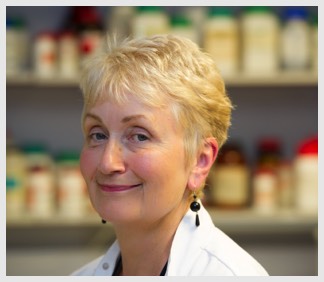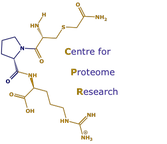
Ms Lynn McLean
Research Assistant
LabA, Centre for Proteome Research
Institute of Integrative Biology
University of Liverpool,
Crown Street
Liverpool L69 7ZB
Tel: +44 151 794 5344
Tel: +44 151 795 4392
Email: lmclean[at]liv.ac.uk
Research Assistant
LabA, Centre for Proteome Research
Institute of Integrative Biology
University of Liverpool,
Crown Street
Liverpool L69 7ZB
Tel: +44 151 794 5344
Tel: +44 151 795 4392
Email: lmclean[at]liv.ac.uk
Having been told by my father that ‘education was wasted on women’, I left school in 1967, at the age of 16, following ‘O’ level’s, to work as a junior technician with Professor R.A. Gregory at the Department of Physiology, in Liverpool. He had been nominated for a Nobel Prize in Chemistry in 1954, the year that it was awarded to Linus Carl Pauling; elected a Fellow of the Royal Society in 1965 and awarded a CBE in 1971. This was my first introduction to scientific research and I was so captivated by his dedication and enthusiasm, I discovered that research was what I wanted to do for the rest of my working life.
I went on to work with other groups within Physiology, still involved in research, but with applications to patient care at the Royal Liverpool Hospital. I continued as a research technician, following my marriage and move to Toronto University, Canada, where I was involved in kidney function, measuring renin-angiotensin responses using bioassay techniques in collaboration with Toronto General Hospital. I then returned to England when I started a family and spent the next few years setting up home and rearing the children.
Following my career break, I returned to education in 1978, studying for ‘A’ levels then reading Biochemistry at Liverpool. As an undergraduate, I worked within the pharmaceutical industry using a variety of analytical techniques including GLC, HPLC to analyse the raw material used in the production of drugs. I also worked at the Dept. Endocrine Pathology Alder Hey Children’s Hospital which provided a diagnostic service for the National Health Institutions throughout the north west of England. Primarily, the work involved radioimmunoassay and during my time there I developed the assay for routine measurement of Human Placental Lactogen in serum.
Following my graduation in 1981, I returned to my role as a research technician in the Veterinary School at Liverpool where I worked with Dr R.M. Batt on enzyme function of the gut in Irish setter dogs. In addition to my own research projects, I supervised five other technicians and PhD students and ensured the smooth-running of the research group as a whole. As a result of changes within the school, I took sole responsibility for running an in-house diagnostic service, detecting exocrine pancreatic insufficiency in dogs, liaising directly with veterinary surgeons.
In March 2002, while still working within the Veterinary School, I had the great privilege of joining the Centre for Proteomic Research with Professor Beynon. This was a steep learning curve and my training in proteomic techniques began. Initially, I was involved in many exciting and varied research projects; analysis of subcutaneous gel in chicks; changes in the proteome of chicken and carp skeletal muscle; analysis of urinary cauxin in felines and studies into scent marking in mice. I continue to support our collaborating groups within and outside of the University, preparing concatenated proteins and recombinant proteins, used in behavioural and structural studies and mass spectrometry quantification.
cont’d…
I went on to work with other groups within Physiology, still involved in research, but with applications to patient care at the Royal Liverpool Hospital. I continued as a research technician, following my marriage and move to Toronto University, Canada, where I was involved in kidney function, measuring renin-angiotensin responses using bioassay techniques in collaboration with Toronto General Hospital. I then returned to England when I started a family and spent the next few years setting up home and rearing the children.
Following my career break, I returned to education in 1978, studying for ‘A’ levels then reading Biochemistry at Liverpool. As an undergraduate, I worked within the pharmaceutical industry using a variety of analytical techniques including GLC, HPLC to analyse the raw material used in the production of drugs. I also worked at the Dept. Endocrine Pathology Alder Hey Children’s Hospital which provided a diagnostic service for the National Health Institutions throughout the north west of England. Primarily, the work involved radioimmunoassay and during my time there I developed the assay for routine measurement of Human Placental Lactogen in serum.
Following my graduation in 1981, I returned to my role as a research technician in the Veterinary School at Liverpool where I worked with Dr R.M. Batt on enzyme function of the gut in Irish setter dogs. In addition to my own research projects, I supervised five other technicians and PhD students and ensured the smooth-running of the research group as a whole. As a result of changes within the school, I took sole responsibility for running an in-house diagnostic service, detecting exocrine pancreatic insufficiency in dogs, liaising directly with veterinary surgeons.
In March 2002, while still working within the Veterinary School, I had the great privilege of joining the Centre for Proteomic Research with Professor Beynon. This was a steep learning curve and my training in proteomic techniques began. Initially, I was involved in many exciting and varied research projects; analysis of subcutaneous gel in chicks; changes in the proteome of chicken and carp skeletal muscle; analysis of urinary cauxin in felines and studies into scent marking in mice. I continue to support our collaborating groups within and outside of the University, preparing concatenated proteins and recombinant proteins, used in behavioural and structural studies and mass spectrometry quantification.
cont’d…

B.Sc. University of Liverpool
cont’d…
Since the Shared Research Facility in Proteomics opened in May 2011, I have provided technical support and expertise, and still continue to work on exciting projects: investigation of the differences in protein expression in testes, between two species of drosophila; proteomic analysis of the defence mechanism of caterpillars; identification of the animal species of stone-age, archaeological bone using mass spectrometry; proteomic analysis of CSF in patients with meningitis; comparison of protein expression in different strains of Salmonella; protein discovery in Sodalis glossinidius and human cardiomyocytes.
The group expanded in April 2013 when we were joined by Dr Claire Eyers and her colleagues from Manchester. I continue to have a pastoral role within the group and provide training and guidance to new staff and visitors when required.
During my working life in research, I have continued to meet new challenges and worked with exciting and dedicated people, including everyone in CPR. I am very lucky to have had a job that I have enjoyed for the last 47 years. Not many people are able to say that! I still enjoy my work, but, plan to retire in July 2016. I know that I will miss the day to day challenges that research brings. If I don’t become too forgetful in the next couple of years then maybe I can be persuaded to stay a little longer
Since the Shared Research Facility in Proteomics opened in May 2011, I have provided technical support and expertise, and still continue to work on exciting projects: investigation of the differences in protein expression in testes, between two species of drosophila; proteomic analysis of the defence mechanism of caterpillars; identification of the animal species of stone-age, archaeological bone using mass spectrometry; proteomic analysis of CSF in patients with meningitis; comparison of protein expression in different strains of Salmonella; protein discovery in Sodalis glossinidius and human cardiomyocytes.
The group expanded in April 2013 when we were joined by Dr Claire Eyers and her colleagues from Manchester. I continue to have a pastoral role within the group and provide training and guidance to new staff and visitors when required.
During my working life in research, I have continued to meet new challenges and worked with exciting and dedicated people, including everyone in CPR. I am very lucky to have had a job that I have enjoyed for the last 47 years. Not many people are able to say that! I still enjoy my work, but, plan to retire in July 2016. I know that I will miss the day to day challenges that research brings. If I don’t become too forgetful in the next couple of years then maybe I can be persuaded to stay a little longer
